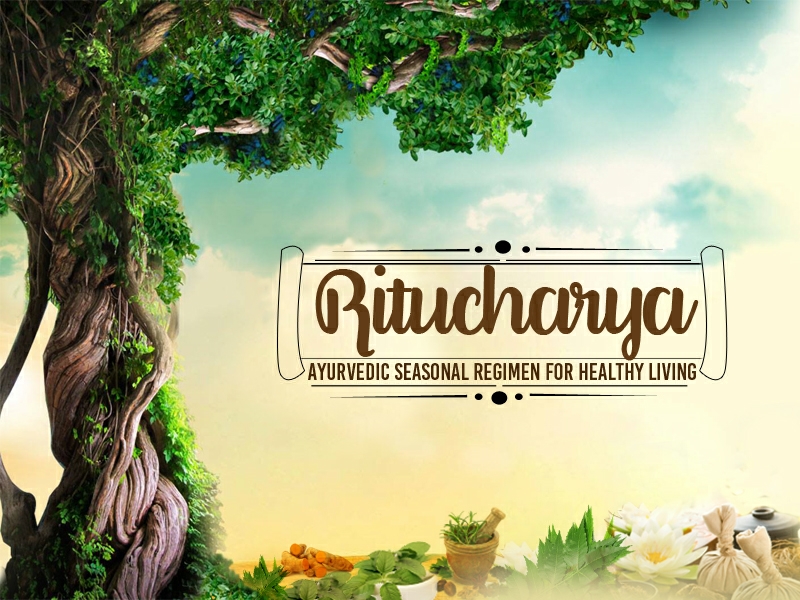Swasthasya Swasthya Rakshanam is the basic principle followed in Ayurvedic system of medicine, which means to maintain the health of the healthy. For this purpose, Ritucharaya (seasonal regimen) and Dinacharya (daily regimen) have been mentioned in Ayurvedic texts.
As human being is also the part of same ecology, therefore the change of season has a direct impact on his life. So, the knowledge of Ritucharya (regimen for various seasons) is very important.

A year consists of six seasons, namely,
- Shishir (Winter)
- Vasant (Spring)
- Grishma (Summer)
- Varsha (Monsoon)
- Sharad (Autumn)
- Hemant (Late Autumn)
Uttarayan and its Effect:
In this period, the rays of sun and wind are powerful. In this seasonal regimen, there is an increase in tikta (bitter), Kashaya (astringent) and Katu (pungent) tastes in the body which reduces strength and causes dryness in the body.
Dakshinayana and its Effect:
In this period, the wind is not very dry, the sun is not powerful and moon is more powerful than sun. The earth becomes cool due to rain and cold winds. There is a predominance of Amal (sour), lavan (salty) and Madhura (sweet) tastes. So, the strength of a person is more in this period.
Regimen of different seasons mentioned in Ayurveda is as follows:

- Shishir (winter): Mid – January to Mid – March
- Vasant (Spring): Mid- March to Mid – May.
- Grishma (Summer): Mid – May to Mid – July.
- Shishir (winter): Mid – January to Mid – March
- Foods having amal (sour) taste should be preferred.
- Cereals, pulses, new rice, corn should be taken.
- Ginger, garlic, haritaki (Terminalia chebula), pippali fruit (Piper longum), cow ghee and milk should be included in the diet.
- Foods having katu (pungent), tikta (bitter) and Kashaya (astringent) predominant rasa should be avoided.
- Foods having sheet virya (cold potency) should also be avoided.
- Lifestyle: Massage with oil and bathing with lukewarm water, exposure to sunlight should be preferred.
- Vata aggravating lifestyle such as sleeping late at night, exposure to cold wind should be avoided.
- Vasant (Spring): Mid- March to Mid – May.
- One should take easily digestible foods in this seasonal regimen such as old barley, wheat, old rice. Among pulses, moong daal can be taken. Food items having tikta (bitter), katu (pungent) and Kashaya (astringent) tastes should be preferred.
- Honey should be taken in spring season.
- Foods having sheet virya (cold potency), snigdha (viscous), Madhura (sweet) should not be preferred.
- Lifestyle:
- Exercise should be done during this season.
- Massage with powder of Chandana, Agaru, Kesara is advised.
- Day-sleep is contraindicated during this season.
- Grishma (Summer): Mid – May to Mid – July.
- The predominant rasa is katu and Mahabhuta are Agni and Vayu during this seasonal regimen.
- Foods which are light to digest, those having Madhura (sweet) taste, sheeta (cold) potency, drava (liquid) guna (quality) should be preferred.
- Drink plenty of water, fresh buttermilk with lunch, fruit juices in grishma ritu.
- At bedtime, milk with sugar candy should be preferred.
- Foods having Lavan (salty), katu (pungent) and amal (sour) tastes and ushna virya (hot potency) should be avoided.
- Lifestyle
- Day sleep is recommended.
- Staying in cool places and applying sandalwood paste are helpful.
- Excessive exercise or hard work should be avoided.
- Too much indulgence in sexual intercourse and alcoholic preparations are prohibited.
- Varsha (Monsoon):Mid – July to Mid – September.
- Foods having amal (sour), lavana (salty) taste, snehana (unctuous) qualities are to be taken.
- Medicated or boiled water should be taken in this season.
- Foods which are heavy to digest, intake of churned preparations having more water, wine should be avoided.
- Lifestyle:
- use of boiled water for drinking and bathing should be used.
- Getting wet in the rain, day – sleep, should be prohibited.
- Sharad (Autumn): Mid- September to Mid -November.
- Foods having Madhura (sweet) and tikta (bitter) taste, laghu (light to digest) and having cold potency are advised.
- Foods such as wheat, green gram, honey, sugar candy are to be included in the diet.
- Hot, bitter and astringent foods are to be avoided.
- Lifestyle:
- Food should be eaten only when there is a feeling of hunger.
- Day-sleep, excessive eating, excessive exposure to sunlight are to be avoided.
- Hemant (Dry Autumn): Mid – November to Mid – January.
- One should take unctuous, sour, salty and sweet foods.
- Milk, milk products, sugarcane products, fermented preparations, sesame seeds should be included in the diet.
- Vata aggravating foods such as light, cold and dry foods should be avoided.
- Lifestyle:
- Exercise, body and head massage should be preferred.
- Intake of warm water is recommended.
- Exposure to cold wind, habit of day sleep etc. should be avoided.
Thus, Ayurveda has set up regimen for various seasons to obtain health and prevent diseases.
Disclaimer:-
This article is not a substitute to the standard Medical Diagnosis or personalized Ayurvedic Treatment! It is intended only for Information!
For experts consultation, please write us at care@blessayurveda.com.
1,922 total views, 4 views today